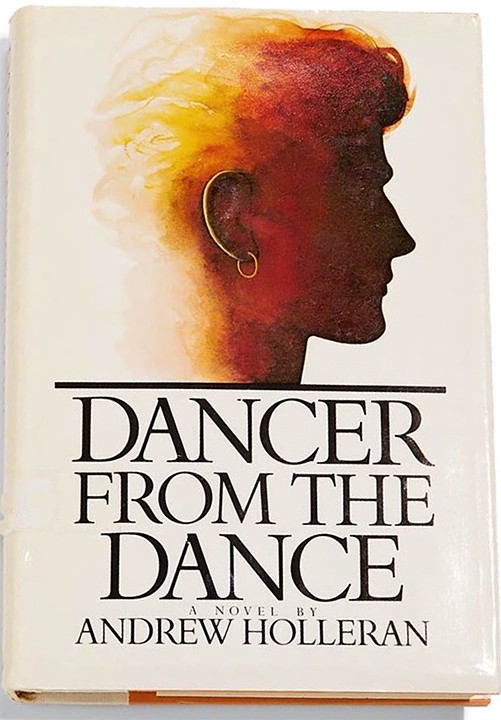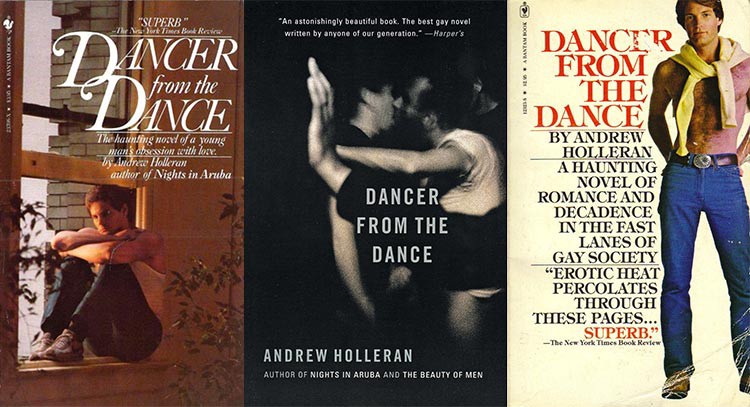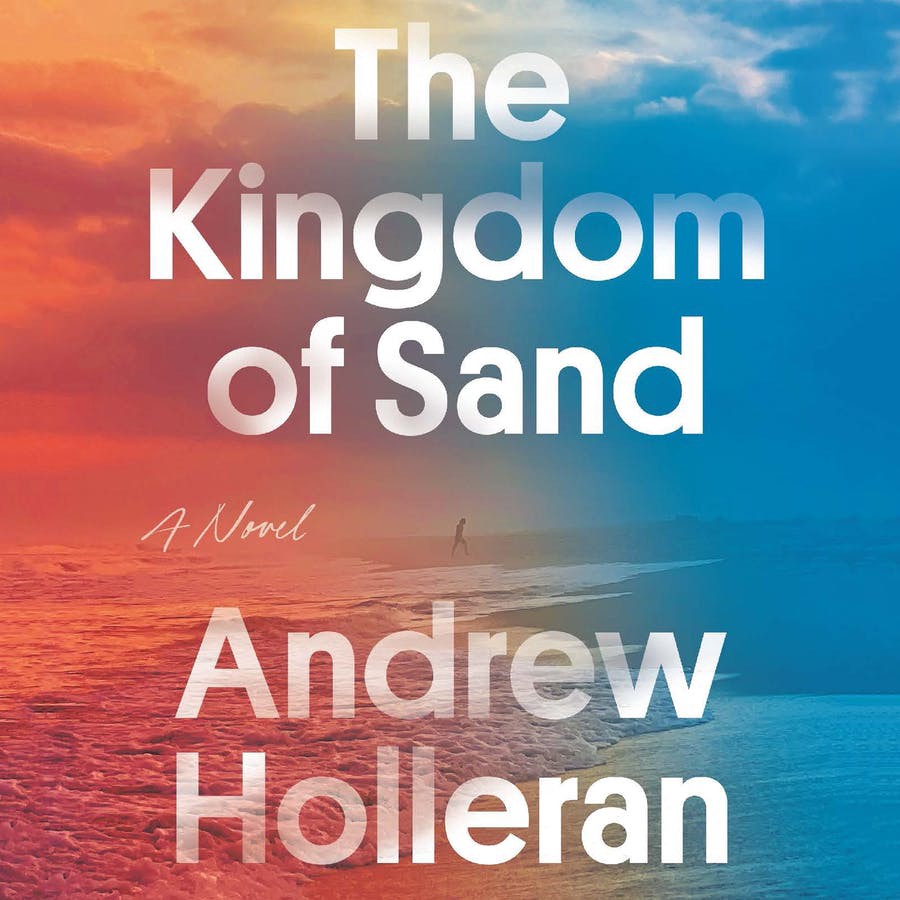Andrew Holleran's first novel, DANCER FROM THE DANCE, is acclaimed as one of the greatest post-Stonewall novels of all time, and so it has remained, for decades. I talked to Holleran when the book first appeared (1978)…

To enter New York by train, one must descend through the earth, travel underwater, and then emerge like a groundhog in a world of grotesque shapes.
The air is dangerous, the automobile traffic suicidal, the people impossible.
New York is where all the great fringes of art combine to form one giant fringe.
Yet, ironically, in the very act of bringing one so close to death, New York City makes one come alive. Artists have appreciated this for years and that is why they love the Big Apple so much.
And if there is one place in New York City where writers gather — poseurs and professionals among them — it is Greenwich Village — there, one can be exposed to every imaginable style and come away thinking that substance is the weirdest commodity of them all.
That is why macho Ernest Hemingway hated the Village and Dorothy Parker did not. That is also why Ernest Hemingway shot himself to death in Idaho and Dorothy Parker did not (to be sure Dorothy, very frankly, did drink herself to death). They each learned that with every new artistic success acclaimed by New York, another part of their character died.
So, in a way, it is strange to read a book that has captured the life of New York — especially gay New York — and not come away from it feeling depressed.
That is what Andrew Holleran has seized upon in his novel DANCER FROM THE DANCE and, taken in the context of artistic life in the Village and New York city in general, his accomplishment is truly unique.
For, in this work, he has assembled the things that every gay male knows and suffers with if he lives in a big city, and he has put it together in a bit of literature that should outlast this season and the next and hopefully our own generation.
DANCER FROM THE DANCE, first published by William Morrow & Co. in 1978, is not, thankfully, yet another "lovely loving" novel about "love." One does not have to be too jaded to appreciate that. One just has to be cold and battered like most Manhattanites. One has to be lonely and afraid and adrift in a society that encourages all of these qualities, and rewards them handsomely.
Holleran's book will not cure any of these ills nor will it address them directly or attach a political statement to them, except as an afterthought, almost at the end.
What the novel will do is take you from wherever you're sitting and drop you in the arms of two characters named Sutherland and Malone.
They are, for me, the two extremes of the urban gay experience: the witty, cynical, chic, and artificial joined happily, as mother to daughter, to the slow, handsome, fair, and un-corrupted. They meet, befriend each other, dance, and die. Or do they?
They carouse through the Twelfth Floor, a warehouse-like discotheque, whose patrons might easily be standing at Philadelphia's Second Story discotheque, before its clientele was sanitized, homogenized, and straightened up.
And the characters one meets along the way are the same tired people one sees on Fire Island or Atlantic City, weekend after summer weekend after summer weekend — until one realizes that these are one's very own friends.
And even Malone's Italian-American lover, Frankie, is an archetype one has come to love and hate — the man who wants a faithful lover acquired through promiscuous channels and who wants exciting, exotic love, except that it is patterned directly on Mrs. Ward Cleaver, Harriet Nelson, and the rest of the middle class television housewives we grew up with on 1950's and 1960's American TV.
It is the story of an innocent — Malone — who, like the characters of a century ago, travels to the wicked European continent to see Rome and die, but the New Rome is New York, and the continent is an island of civilized savages. Like one of Henry James' own, the characters cross from X to Y, and emerge at opposite ends. It is not Malone who finds love — he disappears very cynically. And Sutherland, who declares that "no one past the age of 30 should have more than three good friends," dies during a party arranged to solidify Malone's love of another man.
And where does the person of Andrew Holleran fit into all of this? Under a flood of publicity, that's where, deep in the middle of Greenwich Village, in an apartment that is both a tribute to New York's rank control and an impossible place to have created a work as gifted as this. He is stunned by the publicity surrounding the book and very pleased. What writer — like Holleran — who has filled a suitcase with seven years' of pink rejection slips, would not be?
The book is already in its second printing. The telephone has begun to ring. There are tempting offers and, also, for Holleran, there is the reality that the publicity the book has received can overwhelm, even destroy.
The story of how he wrote DANCER FROM THE DANCE has been told once and doubtless will be told again. It went through three drafts suggested by Holleran's agent, Pat Loud of public television's An American Family documentary fame: she saw possibilities in the book but wanted Holleran to polish the rough corners. He did. Five publishing houses then rejected it. The closeted VP of one thought it "out of touch."
The author is not. He's read widely, an uncommon trait among writers these days. He knows the difference between Merle and Henry Miller and that the Oresteia is not a Greek restaurant. He credits the Iowa Writers Workshop with imparting one of Dwight MacDonald's favorite nostrums — that in order for an artist to create, he must believe in something, romance, sex, communism, anything — even his own importance. One must, to contradict F. Scott Fitzgerald, say something in order to have "something to say."
And what does Andrew Holleran have to say? A lot! Read on, dear reader.

Rich Grzesiak (RG): Do you really believe, as one of the characters says in the book, that gay men "have to move from pissing on each other to crying on each other"?
Andrew Holleran (AH): I do believe it, in a sense. It speaks for itself. Gay people should go beyond pornographic sex and into human relationships. That's what crying stood for in that context.
RG: Toward the end of DANCER FROM THE DANCE, in referring to the people on Fire Island, you describe them as a "tiny fraction of the mass" — you write, "Of course our friends were all on the beach. They couldn't be bothered to come in and make a political statement at a Christopher Street rally." Is that your general view of things?
AH: That was an initial reaction I had one day when I was marching, but then I realized that there are people who sincerely politically think that the best thing for gay people to do is not to march. So I can't argue about the people who stay at the beach thinking that the march is a bad political move. In that sense, it's a cheap shot. On the other hand, it's been an irritation I've always felt when marching on a sunny afternoon.
RG: At another point in the book, a character laments, "I don't think that two men can love each other. It will always be a sterile union associated with guilt. Life would be marvelous if we weren't homosexual." We have all reflected on that at some point.
AH: Sure, and I do think those things. The whole point about the book — the pleasure of writing this book — was putting thoughts into different characters that were thoughts I had felt, but to say that that is my final thought is obviously not correct.
It's one thing I have thought and one thing that gay people do think.
But I don't think that at all — as a concluding judgement on the subject — I couldn't get out of the bed in the morning if I did! Obviously, every time we go out we are thinking that the opposite is true.
RG: Many reviews of your novel have concluded that it's excellent but deplored the fact that it had to be written under a pseudonym. In George Whitmore's review of DANCER FROM THE DANCE in Gaysweek, he says, "But it is regrettable that a book of this quality had to be written under a pseudonym."
AH: But I didn't have to, though, that's the funny thing. People think that. I realized in an interview recently that the interviewer thought I had adopted a pseudonym just for this book. It's not true.
I'm going to use a pseudonym all my life and I did it for a reason George Whitmore mentioned in his article. He said, "Perhaps he did it out of sexual vanity."
When I finally did meet George Whitmore at a party, I went up to him and said, "What did you have in mind? Is there some Freudian theory I haven't heard of? Is this all clitoris envy or something?"
No, he said that he thought that when one went out to the baths, it might be convenient not to be identified as Andrew Holleran.
It's true. I couldn't have any kind of life. I like my life the way it is and I'm happy that this is happening to another person. The craziness (of the publicity) is very deleterious to a writer and so the pseudonym is one way of keeping it away from me.
RG: You write, "Someone should record the madness, the despair of the old time queens." I think you've accomplished that with DANCER FROM THE DANCE, but what was your own intention — to record things, or to get a novel out of your system?
AH: Both. One records things that one cares for. That's the only way to triumph over oblivion, to put it pretentiously. I was very depressed and this book got a lot a lot out of me that was upsetting me a great deal. It was both a psychotherapeutic and artistic enterprise and impulse.
RG: One point I try to make is that DANCER FROM THE DANCE is not about love but friendship.
AH: it's about both. You're right, it's about friendship in the end. The curious paradox is that people search for lovers side by side and end up spending most of their lives together as lovers, while not being lovers. Do you know what I mean?
RG: The search for love is not love any more than the dancer is the dance…
What do you have in mind next?
AH: My editor asked me that too. A friend said to me tonight that he was sure there would be a sequel.
I really don't know until I sit down. Only in the last three days have I gotten some time to myself start writing again. It's always scary.
You don't know what's going to happen. I wish I could say.
The personal response to the book has been wonderful. I just got a wonderful letter this morning from an old friend who remembered that I refused to dance with him five years ago on Fire Island (laughter).
Things like that make me crazy, they are so charming.
The Washington Post review was a big yawn. The Post dismissed the novel with the line, "It had a lot of pretty writing, but pretty writing cloys."
I was furious! The road is not going to be as euphoric as it's been. But I won't stop writing: it's what I have always wanted to do.
ADDENDUM
This interview was originally published on October 15, 1978 in the Philadelphia Gay News with the headline, "DANCER FROM THE DANCE author shuns publicity."
It was my first really "big interview" with a famous literary star. My bloated young ego was in tatters at what I thought was not an adequate, attention-grabbing headline (laughter).
Andrew Holleran had just written what was to become acclaimed as one of the greatest post-Stonewall novels of all time, and so it has remained, defying the decades since its release. I was privileged to have a chance to speak to this literary lion.
I was nervous — very — when talking to Holleran, and if I had to do it over, I would have asked much better questions (ah, the wisdom that the passage of 40+ years brings!).
I was trying to sound very literary from the git-go in this feature without losing the confrontational style that was later to become my trademark. Fortunately, Holleran treated me with the utmost civility.
DANCER FROM THE DANCE is one of those novels that I believe has never gone out of print in some format or other.
I hope my reposting of this interview for the first time digitally will spur many readers to discover or rediscover the greatness of Andrew Holleran's talent.
Andrew Holleran has a new novel out, THE KINGDOM OF SAND (Macmillan; $27, hardcover) available in Kindle and other formats as well.

The Los Angeles Times' reviewer shouts this encomium: "Andrew Holleran should be a giant of queer literature. His new novel on aging proves it." Read more at Los Angeles Times.
